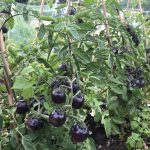I’m an organic gardener and avoid using chemicals, I’m particularly guarded around edible crops, such as on my allotment. However, it’s been bugging me in recent years that so many people have been calling for glyphosate, the chemical used in many weedkillers like Round Up, to be banned outright with very little research to support their reasons why.
Essentially it is believed that glyphosate is a carcinogenic substance, it is thought to potentially cause cancer. My bug bear is people calling for an outright ban before this is even proven and without even considering weed killer’s different uses. The biggest being agricultural use where weedkiller is used en masse not just to kill weeds but on crop plants to make them easier to harvest, this is pretty much the only way glyphosate would enter a normal person’s body. This is of big concern to me. Equally, councils and parks using it to spray large expanses means the person spraying is exposed to far more spray and mist than the average person.
Glyphosate in home use however, where someone might spray it once every year or two on a problem patch of bindweed or bramble is an entirely different matter. People spraying or painting glyphosate onto these rare instances are incredible unlikely to have the chemical enter their body and certainly nowhere near the levels described above. This distinction is critical and every news story and campaigner conveniently ignores this.
If I sound like I’m defending a potentially dangerous chemical I’m not, I’m defending real news in a time of fake news. I want to understand the true facts, something I find incredibly difficult to find – which is surprising given how much people claim to know everything there is about glyphosate as fact. If glyphosate is as bad as claimed we need to know, if it’s not, we need to know that too. Another bug bear of hysteria around one topic is that it ignores all of the other potentially harmful, perhaps worse, substances people aren’t talking about.
To add to the argument I’m going to start documenting actual research from credible sources below. Some will say glyphosate is bad, some will say it’s fine. But by going direct to the source, we can start to discover the real picture and draw our own accurate conclusions. If you know of a research study available online (the original research report, not a news story’s interpretation of one) please let me know and I’ll add it below.
Glyphosate research
Below is a list of research, the important thing to remember with each piece of research’s conclusion is that it isn’t actually conclusive around glyphosate as a whole! Which may sound ridiculous but research all has different methodologies and are often investigating only a limited number of variables, which in isolation can be misleading. We need lots of research and to build a wider picture.
- National Toxicology Programme for US Government: This page links to three studies that show glyphosate may and also is not a carcinogenic substance. It also outlines in detail what the US Government is doing to research the subject. Link: https://ntp.niehs.nih.gov/results/areas/glyphosate/index.html
- Bio Med Nature: “Our results suggest that chronic exposure to a GBH in an established laboratory animal toxicity model system at an ultra-low, environmental dose can result in liver and kidney damage with potential significant health implications for animal and human populations.” However it found high doses did not. Link: https://ehjournal.biomedcentral.com/articles/10.1186/s12940-015-0056-1
- University of Caen: highlighting the importance of understanding the other substances glyphosate based fertilisers can contain, which potentially may be the most harmful elements. Link: https://www.ncbi.nlm.nih.gov/pubmed/23000283/ (thanks to Mark Mackie for sending this)




Research can be a wonderful thing, especially when you get behind the reports and work out who has paid for them! So, as in so many fields, we can have research which says something is OK and other research that says it isn’t.
I don’t ban chemicals completely. I aim, wherever possible, to use alternatives (slug-wise nematodes or non-metaldehyde pellets when it’s too cold for nematodes to work) but will occasionally use glyphosate when it’s really justified. But then I use glyphosate, mixed from concentrate. I refuse to go anywhere near Roundup. So much research seems to concentrate on the Roundup formulation as Roundup has somehow become synonymous with glyphosate, just as Hoover has with vacuum. cleaner. It’s what gets added to make Roundup that worries me and I suspect that the additions are more harmful than the base chemical. Indeed, there seems to be a large body of opinion that agrees with me.
I’ve lost the citation now but, for example, in a report published in 2013 or 2014, Roundup was resoundingly criticised and “The researchers discovered that while glyphosate and its amino acid metabolite, aminomethylphosphonic acid (AMPA), showed little to no observable toxic effects in isolation, a glyphosate-based formulation containing adjuvants produced a variety of adverse effects on cellular oxidative balance….”. Or, a bit more recent: https://journal-neo.org/2017/08/30/monsanto-it-ain-t-glyphosate-it-s-the-additives/
The Wikipedia page on Glyphosate references enough research and other articles to make your list very long indeed! (https://en.wikipedia.org/wiki/Glyphosate). But you don’t want to know that, do you! I’ll shut up now.
A thoughtful blog Jack. A friend asked me for advice on clearing weeds between their paving and I was torn. I didn’t know whether to take an oragnic fundamentalist line that if you use glyphosate you’re ‘part of the problem’ or to come down like you that there’s a huge difference between spraying an entire field with it compared to dabbing it on perennial weeds (my favoured method with bindweed at the allotment was to train it up a cane then paint it with glyphosate with a brush). Since I cleared our garden I haven’t had use for it, but it was essential in killing off an ivy at the root and some self seeded sycamores.
There’s a similar argument with building materials – if someone works in a joinery sawing wood with powertools all day you’d expect them to have full PPE, dustmasks, extraction fans and so on. If you saw a couple of planks for a DIY project in the garden, you’re probably ok with more elementary precautions.